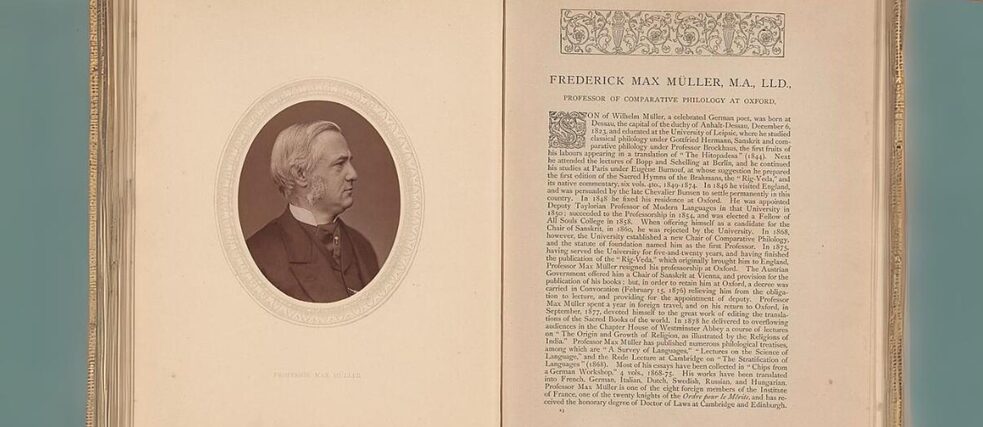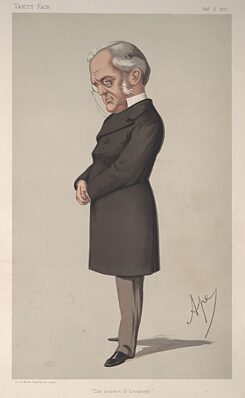From ‘Marg’ to ‘Bhavan’ to the Man Himself
Journey in Reverse

For someone who didn’t identify himself as a “doer”, Max Mueller achieved a lot in his distinguished and prolific career. An intellectual rebel and an ‘influencer’ par excellence, what relevance do his ideas have for contemporary India, and how does he speak to the cultural anxieties of the times we live in?
By Palash Krishna Mehrotra
Friedrich Max Mueller, for me, has always been associated with a road and a building. The India International Centre in New Delhi is located at 40, Max Mueller Marg, a road which is like the Bermuda’s triangle of auto-rickshaws. You see one crawling towards you in the distance, and then it vanishes into thin air. Much like Mueller’s legacy.
The building is Max Mueller Bhavan at Mandi House. Nirad C. Chaudhuri, in Scholar Extraordinary, his biography of Mueller, was not too happy with him being transformed into a bhavan: “Through this, the Germans have put the memory and prestige of Max Mueller behind their cultural propaganda though he was only interested in presenting the rediscovered Ancient India, and not Germany, to modern Indians.” Chaudhuri was writing in 1974, when Germany was two nations, a time of propaganda wars, but his point about the rediscovery of Ancient India is an important one. Mueller’s relevance today needs to be evaluated in that context.
Mueller, no doubt, was a fascinating character. A prolific Sanskrit scholar, and a towering public intellectual, his interest in India went beyond ideas. He was a supporter of reform movements of the time, like the Brahmo Samaj, and took strong moral positions against customs like widow burning and child marriage. He was also a man of contradictions: While he celebrated the suppression of the 1857 ‘Mutiny’, he also believed that Indians should govern themselves, albeit under the wider umbrella of the British Empire.
A consummate intellectual, he believed wholeheartedly in the life of the mind. In his autobiography, he argues against his friend, the Oxford polymath, John Ruskin, who said, “What we think, or what we know, or what we believe, is in the end of little consequence. The only thing of consequence, to my mind, is what we do.” Mueller, on the other hand, admits that “I have never been a doer. I have neither fought battles, nor helped to conquer new countries, nor joined in any syndicate to roll up a fortune. I have been a scholar, a Stubengelehrter.” To this, we might add, that he was also the writer of impeccable English prose, which is a pleasure to read even today.
An Age of Intellectual Ferment
Mueller’s ideas kept changing over the years. For instance, at one stage he spoke of the Rig Veda (his great translation project, apart from editing The Sacred Books of the East) as representing the intellectual childhood of man, with Kant’s Critique of Pure Reason (which he translated from German to English), representing ‘manhood’. A year before his death, Mueller called Vedanta philosophy “a system in which human speculation seems to have reached its very acme.”A German philologist in Victorian Britain, he inhabited a time of great intellectual ferment. Darwinism was in the air, and science was attempting to replace the divine. Britain’s imperial presence in the Subcontinent was making ancient Indian texts available to scholars for the first time. As John Davis and Angus Nicholls point out:
By focusing on Sanskrit and ancient Indian culture, Max Müller was moving himself into an intellectual space that was seen by many, particularly in the German states, as at the cutting edge of philosophy, philology and religious thought. Ancient Sanskrit texts, some believed, offered insight into a system of thought and belief predating the classical period, and would therefore increase knowledge of the present day by unearthing detail further in the past and by enabling greater understanding of the true, original meaning of philosophy and its concepts.
While some on the Hindu Right have had issues with Mueller’s attitude towards the missionary aspect of Christianity, it should be noted that his was a complex position. As Johannes H Voigt points out in Max Mueller: the Man and his Ideas, he favoured a “liberal” Christianity, which allowed for “personal interpretation and national peculiarities. Missionary work was useful not for bringing non-Christians into the fold of dogmatic faith but for the spread of those tenets of Christianity that were acceptable and beneficial to all of mankind.” In a letter to the Duke of Argyll in 1865, Mueller wrote, “The Christianity of our nineteenth century will hardly be the Christianity of India.” This was Mueller’s belief only in the first four decades of his life; towards the end, as mentioned earlier, his devotion to Vedanta was unshakeable.
A House for Mr Mueller or Divided Loyalties?
Mueller’s intellectual legacy is two-fold. Pratap Chunder Mazoomdar, a leader of the Brahmo Samaj, wrote in his obituary of Max Mueller, “He interpreted not only the East to the West, but the East to the East also.” The publication of the Rig Veda was a touchstone in the intellectual history of India. Mueller was aware of it, writing, “It was their Bible, and had never been published before during the three or four thousand years of its existence.” Nirad Chaudhuri recalls his father telling him about it when he was a schoolboy. It changed the self-image of Indian nationalists. If history is a series of turning points, then this definitely was one, and in that lies Mueller’s contemporary relevance.Lord Curzon was annoyed, and apprehensive. He was worried about rebellious Indians rediscovering their glorious past, “with European ideas being thrown in as an outside ingredient in the crucible.” In a letter to Mueller, Curzon writes, “there is no doubt that a sort of quasi-religious quasi metaphysical ferment is going on in India...even reactionary in its general tendency.”
Mueller, meanwhile, was doing the balancing act. Voigt tells a hilarious anecdote of Mueller demonstrating his loyalty to Britain and sympathies to India, by translating ‘God Save the Queen’ into Sanskrit, “which, by the way, seems to have pleased the queen more than her ministers.”
 1875 Vanity Fair caricature of Friedrich Max Mueller.
| © Carlo Pellegrini, Public domain, via Wikimedia Commons
Mueller’s support for India was unwavering. He published letters and columns in The Times arguing against the prevailing wisdom that India was conquered by “blood and iron” and had to be ruled thus. He argued against Macaulay’s arrogance about the superiority of the English language, and the contempt shown by the Empire towards its subjects. He argued for the Ilbert Bill, which was in favour of allowing Indian ‘natives’ to sit in judgement on their British ‘masters’ in the courtroom.
1875 Vanity Fair caricature of Friedrich Max Mueller.
| © Carlo Pellegrini, Public domain, via Wikimedia Commons
Mueller’s support for India was unwavering. He published letters and columns in The Times arguing against the prevailing wisdom that India was conquered by “blood and iron” and had to be ruled thus. He argued against Macaulay’s arrogance about the superiority of the English language, and the contempt shown by the Empire towards its subjects. He argued for the Ilbert Bill, which was in favour of allowing Indian ‘natives’ to sit in judgement on their British ‘masters’ in the courtroom.Even though Mueller never set foot in India, his house in Oxford served as a meeting place for visiting Indian nationalists and reformers—social, political and religious. Swami Vivekananda wrote fondly of his trip. As did PC Mazoomdar: “The shady house at 7, Norham Gardens, was a place of universal pilgrimage to all visitors from the East who travelled to England for study, or business, or pleasure...”
It was a neutral meeting ground where Indians could discuss their desire for self-governing institutions, like enlarging the scope of Legislative Councils in India. The well-connected Mueller didn’t hesitate to use his influence, whether it be Queen Victoria or Prime Minister Gladstone, to further India’s cause, like when he pressed for the urgent release of fellow Sanskrit scholar, Lokmanya Tilak.
Building Bridges
Max Mueller was really famous when he died. In today’s language, he would be termed an ‘influencer’. The world’s press, from America to Japan, wrote about him. Unfortunately, his ideas haven’t travelled well. As a student of Indian Philosophy at St. Stephen’s, Mueller did not feature in our course. As a Philosophy student at Oxford, we read Kant and Leibniz (growing up, Mueller and Leibniz attended the same school), but Mueller wasn’t present.As Ranjit Nair points out in his Preface to Mueller’s collection of Cambridge lectures, India: What Can It Teach Us:
The curious melange of philology and romanticism that characterised the European discourse of Indology of which Mueller was a standard bearer, has attracted critical scrutiny... The solace once offered by this book to generations of Indians living under colonial rule is no longer needed. Nor is the tract so crucial, if indeed it ever was, for Europe’s self image. Yet, the abiding interest of a work that spoke so directly to the cultural anxieties of our forbears cannot be doubted.
The history of ideas is the history of ideas going in and out of fashion. For example, philology, Mueller’s first love, was eventually lost in a battle of prestige with the natural sciences. As James Turner writes in Philology: The Forgotten Origins of the Modern Humanities (2014):
Until the natural sciences usurped its throne in the last third of the nineteenth century, philology supplied probably the most influential model of learning. The immense resonance of philology as a paradigm of knowledge is much less well known today than the parallel influence of natural science, because science won and philology lost. Victors often erase the footprints of the defeated.
As for the allegation that he was an East India Company stooge, it’s false. What’s true is that EIC, along with the Oxford University Press, helped Mueller with access to its archives, as well as financially. Remember, it was no mean task; Mueller dedicated a quarter of his life to the critical edition of the Rig Veda in six volumes. Even the rascally Company had its uses.
